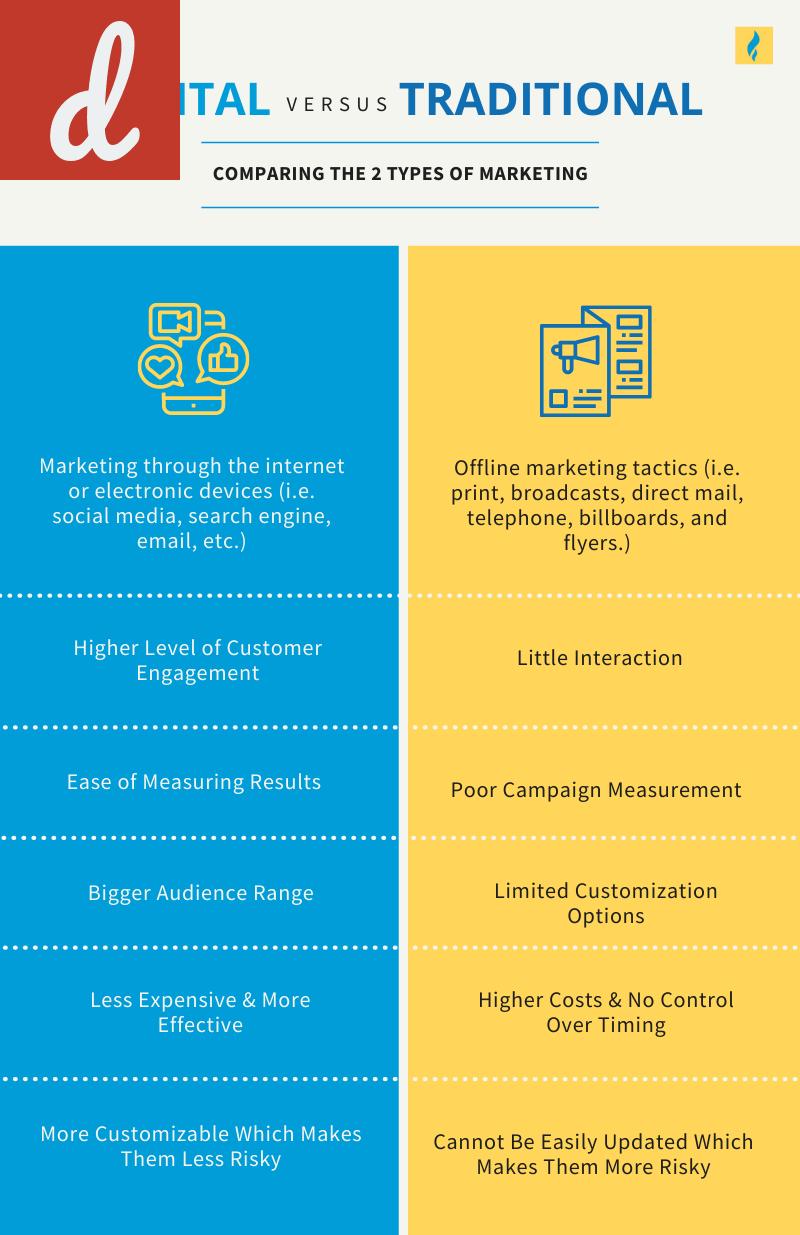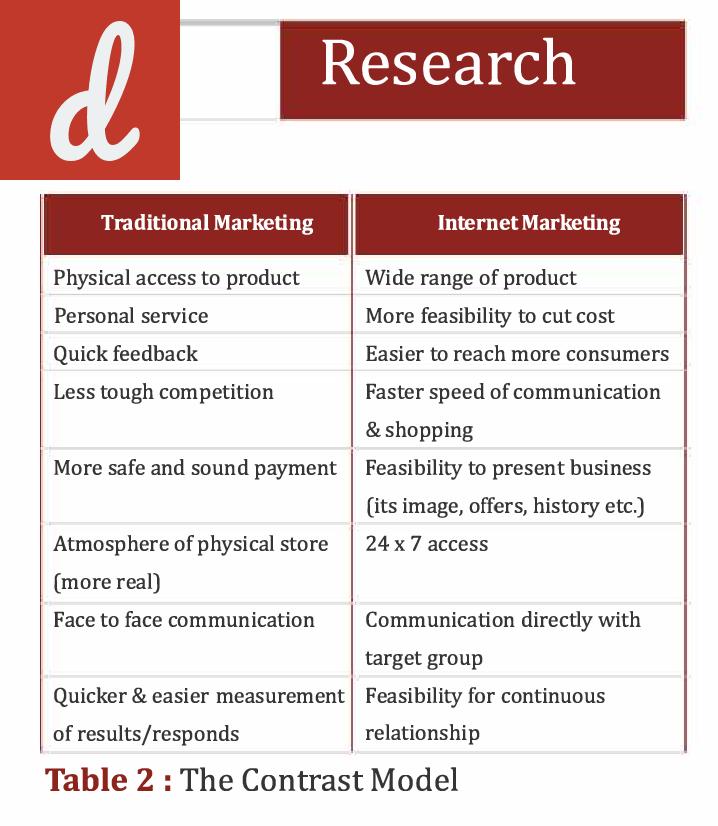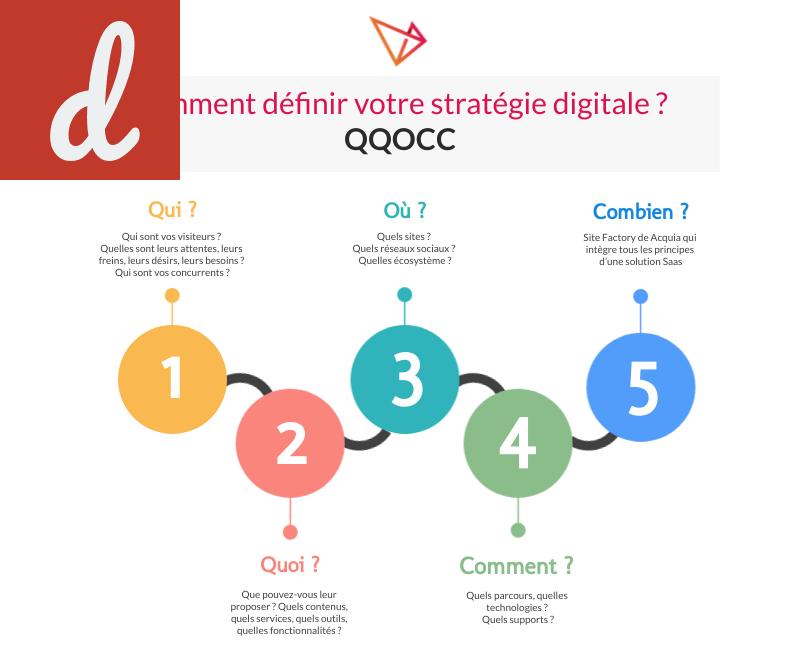The Evolution of Marketing: Digital vs Traditional
Marketing is an essential aspect of any business. It helps connect companies with their target audience and promote products or services. Over the years, marketing techniques have evolved in tandem with advancements in technology. In today's digital age, marketers have a plethora of options at their disposal to reach potential customers. However, traditional marketing techniques still hold some relevance. Let's compare and contrast the evolution of digital marketing with traditional marketing.
Traditional marketing, also known as offline marketing, refers to traditional forms of advertising such as print ads, billboards, direct mailers, TV and radio commercials, and telemarketing. These methods have been used for decades to reach a wide audience. Traditional marketing relies heavily on physical media and in-person interactions. While it can be effective, this form of marketing is often cost-intensive and lacks the ability to precisely target specific demographics.
- Traditional marketing is often disruptive as it interrupts a consumer's experience, such as a TV show or a magazine article. It relies on catchy slogans, jingles, and visual appeal to grab attention.
- It is difficult to measure the effectiveness of traditional marketing campaigns accurately. Marketers have to rely on indirect methods like surveys and focus groups to gauge consumer response.
On the other hand, digital marketing encompasses a range of techniques that utilize online platforms to promote businesses. Digital marketing includes social media marketing, search engine optimization (SEO), content marketing, email marketing, and paid online advertising. This form of marketing offers several advantages over traditional marketing.
- Social media marketing allows businesses to leverage popular platforms like Facebook, Instagram, and Twitter to connect with their target audience. It offers targeted advertising options based on user demographics and interests.
- SEO helps businesses improve their website's visibility in search engine results pages. By optimizing web content and utilizing relevant keywords, businesses can attract organic traffic and improve their online presence.
- Content marketing involves creating valuable and relevant content to attract and retain customers. It can include blog posts, videos, infographics, and more. Content marketing helps establish a brand's authority and build trust with consumers.
- Email marketing enables businesses to reach their audience directly through personalized emails. It can be used to nurture leads, promote products or services, and build customer loyalty.
- Paid online advertising allows businesses to display targeted ads on various platforms, such as search engines and social media. This form of advertising provides precise targeting options to reach specific demographics.
Digital marketing offers several advantages over traditional marketing. It allows businesses to reach a global audience at a lower cost, provides real-time measurable results, and facilitates personalized interactions with customers. However, traditional marketing still has its place in certain scenarios.
In conclusion, the evolution of marketing has brought about a significant shift from traditional marketing to digital marketing. While both approaches have their own strengths and weaknesses, digital marketing has proven to be more effective and efficient in today's digitally connected world. To stay competitive, businesses must embrace and adapt to the ever-evolving landscape of digital marketing.
Main Title: Comparing Digital Marketing and Traditional Marketing: Pros and Cons
With the rise of technology and the internet, marketing has evolved significantly. Traditional marketing methods, such as print advertisements and television commercials, have given way to digital marketing strategies. Today, businesses have to decide whether to invest in digital marketing or stick with traditional marketing. Let's explore the pros and cons of each to help you make an informed decision.
Digital Marketing
Digital marketing refers to any marketing efforts that utilize electronic devices and the internet. This includes methods like search engine optimization (SEO), social media marketing, email marketing, and content marketing. The benefits of digital marketing are as follows:
- Wide reach: One of the biggest advantages of digital marketing is its ability to reach a global audience. With the internet being accessible to almost everyone, businesses can effortlessly target their desired demographics.
- Cost-effective: Digital marketing is generally more affordable compared to traditional marketing. It allows businesses of all sizes to reach their target audience without breaking the bank.
- Measurable results: Unlike traditional marketing, digital marketing provides real-time feedback and measurable results. Businesses can track key metrics like website traffic, conversion rates, and engagement to evaluate the effectiveness of their campaigns.
- Targeted advertising: Digital marketing allows businesses to target specific groups of people based on demographics, interests, and behavior. This targeted approach ensures that your marketing efforts are focused on individuals who are more likely to be interested in your products or services.
However, digital marketing also has its limitations. Here are some of the cons:
- High competition: With the popularity of digital marketing, the online marketplace is highly competitive. It can be challenging to cut through the noise and get your message across effectively.
- Constant adaptation: The digital landscape is constantly evolving. To stay relevant, businesses must keep up with the latest trends, algorithm updates, and consumer behaviors. This requires continuous learning and adaptation.
- Limited offline presence: While digital marketing provides extensive reach online, it may not have the same impact offline. Traditional marketing methods, such as billboards and physical print media, still have their place in reaching certain audiences.
Traditional Marketing
Traditional marketing encompasses the conventional methods that have been used for decades, such as television advertisements, radio spots, newspaper ads, and billboards. Let's take a look at the pros and cons of traditional marketing:
- Established audience: Traditional marketing allows businesses to target specific demographics through channels that have a long-standing audience. For example, television ads can reach a wide range of viewers, including those who may not be active online.
- Tangible presence: Traditional marketing provides a physical presence that digital marketing cannot replicate. Tangible materials like brochures and flyers allow potential customers to have something physical to hold and refer to.
- Trust and credibility: Traditional marketing methods have been around for a long time, and many consumers still trust and value these forms of advertising. Some people may perceive traditional marketing as more reliable and credible.
However, traditional marketing also has some drawbacks:
- Limited audience reach: Traditional marketing methods may have audience limitations. For example, newspaper ads only reach people who read newspapers, and radio spots only reach listeners during specific time slots.
- Higher cost: Traditional marketing methods can be significantly more expensive than digital marketing. The production and distribution costs of print media and television advertisements can add up quickly.
- Difficult to measure results: Unlike digital marketing, it can be challenging to measure the exact impact of traditional marketing campaigns. It's more difficult to track how many people saw your advertisement or whether they took any action as a result.
Ultimately, the choice between digital marketing and traditional marketing depends on your goals, target audience, and budget. In some cases, a combination of both approaches may be the most effective strategy. By understanding the pros and cons of each, you can make an informed decision that aligns with your business objectives.
Which Marketing Method is Right for You: Digital or Traditional?
Marketing is an essential aspect of any business, regardless of its size or industry. It helps companies reach their target audience, build brand awareness, and ultimately drive sales. However, with the advancements in technology, the marketing landscape has evolved, giving rise to both digital and traditional marketing methods. So, which one should you choose for your business? Let's explore the differences and benefits of each.
Digital Marketing:
Digital marketing encompasses various online tactics such as search engine optimization (SEO), pay-per-click (PPC) advertising, social media marketing, email marketing, and content marketing. It leverages the power of the internet and digital platforms to connect with potential customers.
One significant advantage of digital marketing is its ability to target specific audiences. It gives you the flexibility to tailor your message to different demographics, ensuring that your marketing efforts are more relevant and effective. Additionally, it offers real-time analytics, allowing you to track the success of your campaigns and make data-driven decisions.
The Benefits of Digital Marketing:
- Broader reach: With the internet, you can reach a global audience, expanding your customer base beyond geographical boundaries.
- Cost-effective: Digital marketing often requires a lower investment compared to traditional methods, making it more accessible to small businesses with limited budgets.
- Higher engagement: Interactivity on digital platforms allows for a more engaging and personalized customer experience, building stronger relationships.
- Measurable results: Digital marketing enables you to measure key performance indicators (KPIs) and adjust your strategy based on real-time data.
Traditional Marketing:
Traditional marketing refers to offline tactics that have been used for decades, such as print advertisements, billboards, radio and television commercials, direct mail, and event marketing. Although the rise of digital marketing has had a significant impact on overall marketing strategies, traditional methods still have their merits.
One of the advantages of traditional marketing is its ability to reach a local audience. For businesses targeting a specific geographic area, traditional methods can be highly effective in generating local brand awareness. Additionally, traditional marketing can provide a tangible and lasting impression on consumers, such as a physical brochure or a memorable TV commercial.
The Benefits of Traditional Marketing:
- Local targeting: Traditional marketing methods like print ads and local TV/radio commercials can effectively target specific local markets.
- Tangibility: Traditional marketing offers physical representations of your brand that consumers can touch, see, and experience.
- Established credibility: Traditional methods have been used for many years, giving them a sense of trust and reliability among consumers.
- Niche audiences: Some audiences, especially older demographics, may still prefer traditional channels, making these methods essential for certain industries.
Conclusion:
In today's digital age, incorporating digital marketing strategies into your overall marketing plan is crucial. The accessibility, reach, and cost-effectiveness of digital methods make them highly valuable, especially for small businesses. However, this doesn't mean that traditional marketing is obsolete. Depending on your target audience, product, and marketing objectives, traditional methods can still play a significant role in your marketing efforts.
Ultimately, finding the right balance between digital and traditional marketing is key. It's essential to understand your target market, their preferences, and the channels they engage with the most. By considering both digital and traditional methods, you can create a comprehensive and effective marketing strategy that drives results for your business.

Exploring the Benefits of Digital Marketing over Traditional Marketing
In today's digital age, businesses need to adapt to the rapidly changing marketing landscape. Traditional marketing methods, such as print advertisements and television commercials, are no longer sufficient to reach the target audience effectively. This is where digital marketing comes in as the game-changer, offering numerous benefits that traditional marketing cannot match.
One of the key advantages of digital marketing is its ability to target specific audiences. With digital marketing, businesses can tailor their marketing efforts to reach a particular demographic, location, or interest group. This level of targeting ensures that the message is delivered to the right people, increasing the chances of conversion and return on investment.
Moreover, digital marketing allows businesses to track and measure their marketing efforts in real time. Through various analytics tools, businesses can gain insights into user behavior, engagement rates, and conversion rates. This data enables businesses to make data-driven decisions, optimizing their marketing campaigns for maximum effectiveness.
- Cost-effectiveness: Digital marketing offers a cost-effective alternative to traditional marketing methods. For instance, running an online advertising campaign can be more affordable than placing an ad in a newspaper or on television.
- Global Reach: Digital marketing allows businesses to expand their reach beyond geographical boundaries. With the internet connecting people worldwide, businesses can target and engage with customers from all over the world.
Another advantage of digital marketing is its ability to foster customer engagement and interaction. Through social media platforms, businesses can directly engage with their customers, responding to queries and addressing concerns in real time. This level of interaction helps businesses build stronger relationships with their customers, ultimately leading to increased customer loyalty and brand advocacy.
Furthermore, digital marketing provides businesses with the opportunity to create personalized experiences for their customers. Tailoring marketing messages and offers based on customer preferences and interests can significantly enhance the customer experience and drive customer satisfaction.
In summary, the benefits of digital marketing over traditional marketing are vast. From targeted marketing and cost-effectiveness to global reach and enhanced customer engagement, the opportunities that digital marketing presents are unmatched. As businesses continue to embrace the digital world, incorporating digital marketing strategies becomes imperative for long-term success.
Transitioning from Traditional Marketing to Digital Marketing
Marketing plays a crucial role in the success of any business. In today's fast-paced digital era, traditional marketing methods have taken a backseat while digital marketing has emerged as the new buzzword. Traditional marketing relied heavily on print media, television, radio, and billboards. However, with the advent of the internet and social media platforms, digital marketing has become a game-changer for businesses of all sizes.
So, if you're still stuck in the world of traditional marketing and wondering whether it's time to make the switch, here are some reasons why transitioning to digital marketing is a smart move:
- Cost-Effectiveness: Traditional marketing methods can be expensive, especially for small businesses with limited budgets. Digital marketing, on the other hand, offers various cost-effective channels such as social media, email marketing, and content marketing. These channels provide a wider reach at a fraction of the cost compared to traditional methods.
- Targeted Advertising: Digital marketing allows businesses to target specific audiences based on demographics, interests, and behaviors. This level of targeting ensures that your message reaches the right people at the right time, increasing the chances of conversion. With traditional marketing, reaching a specific target audience can be challenging and less effective.
Moreover, digital marketing provides real-time analytics that allow businesses to measure the effectiveness of their campaigns. This valuable data enables them to optimize and improve their marketing efforts continuously.
Digital marketing also offers several other advantages over traditional methods:
- Global Reach: With the internet, geographical barriers no longer exist. Digital marketing allows businesses to reach a global audience, expanding their customer base with minimal effort.
- Interactivity and Engagement: Digital marketing channels provide an interactive platform that encourages engagement and builds stronger relationships with customers. Social media platforms, for example, allow businesses to interact with their audience, respond to queries, and address complaints promptly.
Transitioning from traditional marketing to digital marketing may seem overwhelming at first, but with the right strategies in place, the benefits can be significant. Here are some steps to guide you through the transition:
- Educate Yourself: Familiarize yourself with the digital marketing landscape. Stay updated about the latest trends, tools, and techniques.
- Create a Digital Marketing Strategy: Identify your goals and target audience. Develop a solid digital marketing strategy that aligns with your business objectives.
- Build a Strong Online Presence: Establish a website and create social media profiles for your business. Optimize them for search engines and create compelling content to attract your target audience.
- Explore Different Digital Channels: Experiment with various digital marketing channels such as social media marketing, search engine optimization (SEO), email marketing, and content marketing. Measure the results and refine your approach based on the data.
Transitioning from traditional marketing to digital marketing is an essential step to stay relevant in the fast-paced digital world. With its cost-effectiveness, targeted advertising, and global reach, digital marketing has become a must for businesses of all sizes. Embrace the change, educate yourself, and develop a solid digital marketing strategy to stay ahead of the competition.



Dec 27, 2023 says :
Cómo Utilizar Una Plataforma De Marketing Digital Para Llegar A Tu Audiencia Objetivo